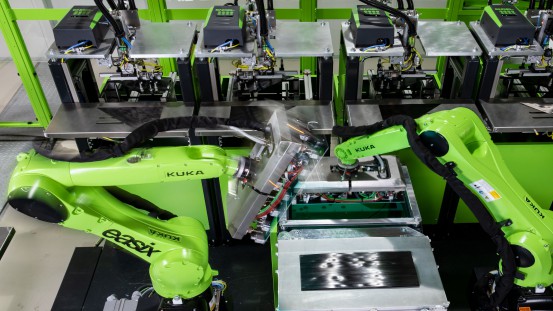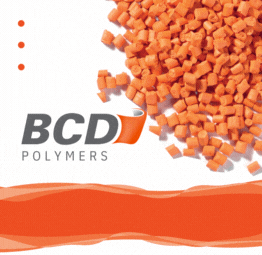Tailor-made composite blanks help to optimally leverage the lightweight design potential of parts. In order to efficiently make these semi-finished products from both glass and carbon fibre reinforced tapes with a thermoplastic matrix, ENGEL combines a tape laying cell with a consolidation unit in a highly automated production line. The integrated process can turn out fit-for-purpose blanks with 15 to 30 tapes in one-minute intervals. It was this high level of production efficiency that convinced the international jury.
Fit-for-purpose composite blanks in one-minute intervals
In order to achieve the shortest possible cycle times, the tape laying cell developed by ENGEL sets up on the pick-and-place approach. The individual tape layers are picked up, visually checked, placed with closed-loop control and spot-welded together. Since the quality of the resulting stack largely depends on the accuracy of the tape positioning, ENGEL has equipped the laying cell with a measuring system that uses high-resolution camera technology, and two high-speed robots.
ENGEL and its partner FILL have developed a production unit based on the heating/cooling approach for the consolidation process which follows immediately downstream. In a fully-automated process, this system consolidates the fibre stacks into a solid panel, while retaining thickness variations generated in a targeted manner.
Because the stacks already obtain the outer contour required for the part when they are deposited, the tailor-made blanks can be shaped and functionalised immediately after consolidation in the ENGEL organomelt process. This further increases efficiency in high volume production. With that innovative production technology, ENGEL and FILL not only address the aviation industry, but also, and above all, the automotive sector as well as the sports equipment and health care industry. From individual tapes through to injection moulding functionalisation, ENGEL offers integrated and fully automated production cells for the entire process from a single source.
The most innovative composite projects in the world
Every year, the JEC Group acknowledges the most innovative composite projects in the world with the JEC Innovation Awards. The criteria are technological excellence and originality, market potential and cooperation between different players in the value chain. These coveted awards are usually granted at the JEC World trade fair, which did not take place this year due to the corona pandemic. ENGEL and the other 2020 winners received their awards on 13 May in the scope of an online ceremony.



